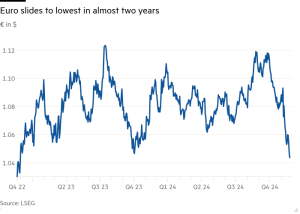Japan’s new kingmaker calls for raising income tax threshold
Unlock the Editor’s Digest for free
Roula Khalaf, Editor of the FT, selects her favourite stories in this weekly newsletter.
Japan’s new political kingmaker is pushing for a historic change to the country’s tax law as the price for co-operating with the hobbled Liberal Democratic party and allowing Prime Minister Shigeru Ishiba to remain in power.
Yuichiro Tamaki of the small opposition Democratic Party for the People has emerged as the decisive factor in Japanese politics after last month’s snap election resulted in a hung parliament.
He is now pushing to raise the threshold at which Japanese residents start paying income tax from the ¥1.03mn ($6,700) level it has been locked at since 1995.
“That was 29 years ago, at a time when there was deflation, and since then, there has been no change in this basic figure,” said Tamaki on Friday. “Now, Japan is experiencing a period of inflation,” he added, noting that the minimum wage had risen about 70 per cent in the intervening decades.
Tamaki’s DPP held talks on Friday with Ishiba’s LDP, the political machine that has controlled Japan for all but a handful of the past 70 years but lost its majority in the election.
Ishiba, who only took office six weeks ago, faces a vote on Monday that could result in him becoming Japan’s shortest-serving prime minister.
That position has left him reliant on the support of smaller opposition parties, chiefly Tamaki’s right-leaning DPP, in order to remain in power and to pass a budget in the coming months, said analysts.
Tamaki argues that his plan, which would raise the income tax threshold to ¥1.78mn and which he said had won significant support among younger voters, would encourage part-time employees to work longer hours, boosting the income of millions of households.
Masamichi Adachi, UBS Securities’ chief economist for Japan, said Tamaki’s push to reform the tax threshold policy should not be underestimated given his once-fringe party’s leverage. “We should certainly take the policy seriously, however uncertain its impact will be on the economy,” said Adachi. “Tamaki is in a strong position.”
The LDP has ruled out further expanding its coalition, instead focusing on negotiating vote-by-vote co-operation with the DPP, which holds 28 seats.
But Tamaki, 55, a former finance ministry bureaucrat, is also resistant to being linked too closely with the LDP, which could suffer further setbacks in next year’s upper house elections, according to analysts.
In Monday’s vote, DPP members plan to back Tamaki for prime minister, a move that will deny Ishiba a clean victory in the first round but will guarantee the LDP leader advances to the second round, where he only needs to secure the largest number of votes, rather than a majority.
Such a manoeuvre would allow Ishiba to prevail while giving Tamaki and the DPP space to claim that they never actively backed him but were merely co-operative at a critical moment.
A similar strategy is likely to play out as Ishiba manages a hung parliament and Tamaki seeks to advance his policy agenda, said analysts. On Friday, he emphasised another part of his platform, a proposal to restrict land purchases by foreigners.
“Currently, it is not possible for someone from Japan to purchase land in China, but the reverse is possible and Chinese can buy land in Japan,” he noted. “We believe that certain kinds of restrictions should be put in place . . . based on the principle of reciprocity.”
#Japans #kingmaker #calls #raising #income #tax #threshold






